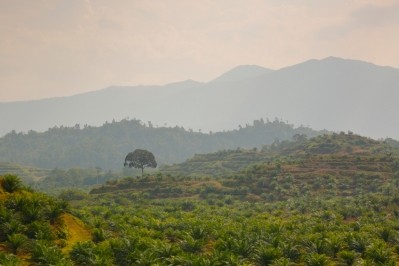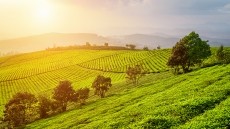THE INGREDIENTS SHOW
Redeeming a bad reputation: ‘Sustainable palm oil is the best oil we have’

Palm oil is a contentious commodity. On the one hand, it is high yield, odourless, features in over 50% of all supermarket products – both in food and non-food categories – and is the most consumed vegetable oil in the world.
On the other, it is frequently associated with deforestation, biodiversity loss and climate change.
The link between these devastating environmental impacts and unsustainable palm oil production is uncontested. However, for the consumer, palm oil’s reputation has been muddied across the board – irrespective of sourcing method.
Consumer distaste for the commodity appeared to grow late last year, when UK retailer Iceland featured a displaced orang-utan in its advertising campaign. The charismatic animal is a victim of irresponsible palm oil production and its impact on deforestation. Indeed, unsustainable sourcing methods are the leading cause of orang-utan extinction.
The advert announced Iceland’s pledge to eliminate all palm oil from its own label products, which experts at The Ingredients Show in Birmingham last week suggested may not be the best way to address the palm oil problem.
Unsustainably sourced palm oil deserves its bad reputation, Solutions 4 Retail Brands’ (S4RB) non-executive director Penny Coates told delegates during a panel discussion at the event.
Yet “sustainable palm oil is probably the best oil we can have”, she continued. Rather than evict palm oil from our food supply chains, “it is really important that we all drive towards sustainable palm oil going forward.”
Inke van der Sluijs, who heads up European operations at the Roundtable on Sustainable Palm Oil (RSPO), also voiced concerns over the ‘replacing’ or ‘phasing out’ strategy.
Iceland’s campaign has been damaging for the RSPO, as well as for its members “who have tried so hard to source sustainably”, she said. “It’s a very unfortunate marketing campaign.”
“Palm oil is four to 10 times more productive than other vegetable oils. So phasing out palm oil is not a sustainable solution. Replacing palm oil [with another commodity, such as coconut oil] would mean placing issues on other regions, on other communities, on other biodiverse areas, so that is definitely not the solution," she continued.
“If you move away from palm oil, who is going to ask for sustainable palm oil?” van der Sluijs added.

Growing demand in developing economies – such as India and Africa where sustainability concerns are given less priority on the economic agenda – presents a challenge for European food manufacturers.
As Nestlé’s head of sustainability for the UK and Ireland Anna Turrell pointed out, “these are markets that don’t have the same level of discourse around sustainability, around responsible sourcing, so we are challenged – but it is also an opportunity.
“We have to continue on this path towards 100% sustainably-sourced…but in parallel, we also have to…start to build that sustainability mindset into those emerging markets, so that we don’t find ourselves competing with companies that don’t care. And that is going to be a very real challenge in the very near future.”
The push towards certification
If touting ‘palm oil free’ products is not the answer, how can industry insure their supply chains do not contribute to environmental crises?
For RSPO, an organisation that aims to ‘make sustainable palm oil the norm’, the answer lies in certification. To meet RSPO’s certification standards, palm oil producers must adhere to a set of environmental and social conditions outlined in its principles and criteria (P&C). RSPO’s P&C were last updated in November 2018.
“When we talk about sustainability, it’s not just environmental. It’s also that we want human rights, children’s rights, we want fair and safe conditions for labourers,” explained van der Sluijs at the conference.
“RSPO has developed four purchasing models to make it possible for companies [to buy sustainably],” she continued.
Each model has varying degrees of sustainability criteria: Preserved, Segregated, Mass Balance and RSPO credit (previously GreenPalm).
“These are perfectly good models to start today, before 2020 hits,” van der Sluijs advised industry delegates, suggesting that buying RSPO-certified palm oil is one way companies can meet their sustainability pledges ahead of deadline. “All these companies have beautiful policies saying that by 2020 they will be at 100% sustainable.” And as there is more supply than demand, companies can purchase RSPO credits to compensate for the volume purchased that was not available as RSPO Mass Balance or Segregated, she continued.
The push towards third-party certification is not a purely internal one. Investors, consumers and retailers can play a role, explained Christie Clarke, a research analyst for global non-government organisation CDP (formerly known as the Carbon Disclosure Project).
CDP works with investors, companies and cities to help calculate their environmental impact.
“Certification definitely provides a clear signal to investors that companies are taking this issue seriously,” said Clarke.
Reputational pressure is also coming from consumers, she continued, citing the 2018 CDP Forests questionnaire. Findings showed that “companies themselves were reporting this reputational pressure…directly from the consumers and [were] really starting to think through how that would affect brand value.”
Analysing responses to CDP’s 2017 questionnaire, the NGO found that one third of companies reported “some sort of corporate loss risk” associated with the forestry commodities they depended on, she continued. “So I think it is coming from multiple avenues, but investors have a role to play and consumers themselves have a role to play.
“Retailers have a different position in the value chain, so they have different ways to influence.”
Nestlé: We need to break the consumer ‘box tick’ mindset
For food giant Nestlé, redeeming palm oil’s negative reputation goes beyond certification, to what “sits underneath it”, said head of sustainability for the UK and Ireland, Anna Turrell.
“Nestlé has been on the responsibly and sustainably sourced palm oil journey for a number of years now,” Turrell told delegates during the panel discussion.
Indeed, aside from a brief three-week stint in 2018, Nestlé has been a long-standing member of the RSPO and already boasts 100% Segregated, RSPO-certified sustainable palm oil in the UK and Ireland.
“Our ambition is ultimately to ensure full traceability and transparency along the supply chain, as well as ensuring it’s responsibly sourced.
“For us, having responsibly sourced palm oil is absolutely imperative,” said Turrell.
In particular, RSPO and supply chain partners can help Nestlé ensure its palm oil supply chain meets its sustainability standards when dealing with longer supply chains.
“All of our direct suppliers are ‘tier-ones’,” Turrell explained. “So they are audited against. Tier-two and beyond, that is where our responsible sourcing programme really kicks in, and that is where we work with partners to make sure that we have direct contact with those supply chain players.”
In Indonesia, for example, where 45% of palm oil is grown by smallholder farmers, Nestlé often finds itself dealing with five or six-tiered supply chains.
“We are directly purchasing from our supplier, who is getting it from their supplier,” said Turrell. “Our ability as an individual company to influence obviously changes as you get further along the supply chain. So we have to get a lot more creative about how we can have influence and drive change.
“That is where the importance of collaboration, and where the RSPO, plays a really important role.”
However, while certification for responsible commodity procurement provides “the stamp on top”, more can be done to educate consumers on the entire sustainable sourcing story, Turrell argued.
“I think what we have to do – and this doesn’t just related to palm oil, but for all commodities – is we need to try to break the consumer mindset, that certification is ‘the box tick’. We need to help consumers understand what that entire landscape looks like.
“Certification is the stamp on the top, but all the stuff that sits underneath it, that’s where we need to be telling the story.”


























